#If Jacques Demy had waited a little longer...
Explore tagged Tumblr posts
Text


















AU: Mylène Farmer as Lady Oscar
Oscar François de Jarjayes is an imposing and enigmatic presence. Her long, wavy, red hair contrasts with her firm and decisive posture, while her deep brown eyes seem to carry the weight of a world divided between duty and desire. Raised as a man, she exudes an aura of natural authority, wearing military uniforms with the same grace as a ball gown.
Despite her striking and haughty appearance, Oscar is profoundly human: a soul in conflict, torn between loyalty to the nobility she swore to protect and compassion for the suffering people. Strong, yet vulnerable, her heart is a storm of repressed emotions, where love and sacrifice intertwine. She is the personification of a rose: beautiful and delicate, yet full of thorns.
#mylene farmer#french#french style#french singers#lady oscar#versailles no bara#80s aesthetic#80s music#Au film#If Jacques Demy had waited a little longer...
55 notes
·
View notes
Text
What We Learned from This Year’s Critics Choice Awards
The 2025 Critics Choice Awards will be remembered for giving us some mind-boggling shockers and throwing us for a loop. If I had a time machine, I’d go back and bet all my life savings on Jon M. Chu winning best Director. (To be fair, that still wouldn’t be a lot of money.)
Critics Choice isn’t typically instrumental in helping predict the eventual Oscar winners. There’s no overlap in the voting bodies and they perhaps hold the lowest profile of the major award ceremonies leading up to the Academy Awards. What they do provide each year is momentum for nominees.
That effect may be even more potent this year. The delayed ceremony (due to the L.A. wildfires) means that the winners were announced right in the thick of the Oscar voting period. Who knows how much winning a major award at this critical moment may influence the final Oscar results?
Here’s how I think this year’s Critic’s Choice mean for this year’s Oscar race.

The Oscar acting categories are locked up
With this year’s Oscar frontrunners all winning at Critics Choice, all four acting races are essentially sealed. Kieran Culkin (A Real Pain) has had his Oscar win for Best Supporting Actor in the bag since December. But the other races had been tight up until fairly recently.
Heading into the Golden Globes, Supporting Actress seemed to be a race between Zoe Saldaña (Emilia Pérez) and Ariana Grande (Wicked). Saldaña’s Golden Globe saw her poke her toe in front but by no means wrapped it up. Other possible spoilers, like Margaret Qualley (The Substance), Isabella Rossellini (Conclave), or Felicity Jones (The Brutalist) never really materialized as effective challengers. If Grande could pick up a couple major award between the Globes and the Oscars, we’d have a tight race on our hands, but all the moment seems to be behind Saldaña at this point. Grande still may win at SAG and we’re yet to understand the full impact of the scandals surrounding Emilia Pérez, but Saldaña has a firm lead at this point.
Best Actor has been a race between Adrien Brody (The Brutalist) and Timothée Chalamet (A Complete Unknown), with Ralph Fiennes (Conclave) as a potential spoiler. The story behind each has been compelling. Brody has now amassed enough wins to prove he’s in pole position. Looks like Timmy will need to wait a little longer for that elusive first Oscar.
Once again, the Best Actress race has been one of the most intriguing narratives of awards season. Demi Moore now seems to have fingers firmly grasped around the Best Actress Oscar for her role in The Substance. This seems like a given at this point, but it was not too long ago where it would’ve been hard to imagine anyone but Mikey Madison winning for her dynamic performance in Anora. And with all the buzz behind Emilia Pérez at one point, there was even thought that Gascón could snatch a historic win. (Cue self-implosion: now.) While the Oscar will now almost certainly go to Moore, I keep saying… look out for Fernanda Torres.

Best Director may be a toss-up
The general wisdom has been that Brady Corbet has Best Director wrapped up. Whether or not The Brutalist takes home the top prize, Corbet’s vision and execution are most certainly Oscar-worthy and exactly the kind of turn Oscar voters typically celebrate.
But the shocking win for Jon M. Chu (Wicked) at Critics Choice has blown up that narrative.
Chu can’t win at the Oscars — he’s not nominated. But his win does suggest that support for the other nominees is fractured. Jacques Audiard’s campaign for Emelia Pérez is floundering which brings down his stock, but Coralie Fargeat’s keeps rising for The Substance. The Best Picture win for Anora at Critics Choice lends credence to Sean Baker’s prospects. All this may come at the expense of Corbet, whose 3.5-hour epic isn’t everyone’s cup of tea.
I still think Corbet is the frontrunner, but I don’t think it’s settled, by any means. I think back to the 1973 Oscars where the Academy selected Bob Fosse for his directorial work in Cabaret over Francis Ford Coppola’s work in The Godfather. While the Brutalist-Godfather comparison has been making the rounds, I just don’t see a Bob Fosse character who can overtake Corbet. Still, I wouldn’t be surprised if Baker or Fargeat’s name was read out on Oscar night.

Yes, The Substance really is that strong
I would’ve bet my life on Critics Choice choosing Anora for Original Screenplay, though A Real Pain and The Substance were strong contenders. Given Anora’s Best Picture triumph, losing out in Screenplay is especially perplexing.
It’s noteworthy that The Substance managed to beat out Anora (need I remind you… the *Best Picture* winner) in the two categories it was most likely to win.
Fargeat’s Oscar nomination over Berger (Conclave) and Villeneuve (Dune: Part Two) is also significant. Mind you, the directors’ branch of the Academy is relatively small and often at odds with the larger membership, but it still suggests that there is a lot of momentum behind this film — much more than just giving Demi Moore a career trophy.
The Substance took home three Critics Choice awards last night, tied with Emilia Pérez and Wicked for the most among films.
What?!
Seriously. Read that again.

Conclave has spoiler potential
Conclave has been this year’s Green Book, which I hate saying, because I think Conclave is a much better film. But it’s the film everyone agrees is very good without anyone thinking it’s the best. Films like this benefit greatly from the preferential ballot format the Academy uses for Best Picture.
With the two major ceremonies so far selecting The Brutalist, Emilia Pérez, and Anora as Best Picture winners, the field is clearly fractured. There’s no real frontrunner. Granted, Anora has been the darling of critics since it premiered at Cannes last May. It might not be a true contender, but it still shows that there’s no clear #1 on that preferential ballot. It’s going to take several rounds to get a winner to 50%.
Conclave’s win for Best Ensemble at Critics Choice was not a surprise, though it did boost its credentials for a major prize. It leads all films with 12 BAFTA nominations and could walk away as the big winner of the night as well. The BAFTAs take place two days before Oscar voting ends.
I’m guessing Conclave is going to be #2 or #3 on a lot of those ballots.
This has become one of the most wide-open Best Picture races in recent years. Looking at the list of ten nominees, there are six titles for which I wouldn’t be surprised if they were called. (And I’m not even including Dune: Part Two on that list, which, quite frankly, should win.)

We haven’t seen the end of the surprises
It’s typical to get some shockers along the way every year, both in the nominations announcements and the award ceremonies. It’s more typical that these are minor upsets that disrupt the established narrative, helping to shape a new storyline in the lead-up to Oscar night, so much so that there’s never much suspense in the end. The most we’ll get is a two-horse race where the horse in behind eventually squeaks through to win at the end.
However, we enter this year’s Academy Awards with a few categories with a much broader peloton and anyone can make that final sprint. With support spread out among so many nominees, that opens the door to not just a few surprises, but BIG surprises. I’m talking Marcia Gay Harden level here — just not in the acting categories, unfortunately.
The lack of a frontrunner in some categories means that vote-splitting can help less-favored nominees emerge victorious. (I suspect this was behind Chu's win last night.)
Oscar voting ends on February 18. We’ve got DGA, PGA, and BAFTAs before then. All these may influence Oscar voting. Here’s hoping award season keeps throwing us some more curveballs to keep us on our toes for Oscar night, March 2.
#movies#Critics Choice Awards#Oscars#Academy Awards#Golden Globes#Anora#The Brutalist#Conclave#The Substance#Wicked#Emilia Pérez#A Complete Unknown#Dune: Part Two#BAFTAs#Adrien Brody#Timothée Chalamet#Demi Moore#Mikey Madison#Keiran Culkin#Zoe Saldaña#Brady Corbet#Sean Baker#Coralie Fargeat#Jon M. Chu
6 notes
·
View notes
Text
Claire Denis’ ’35 Shots of Rum’ “I feel like…I have wings…”
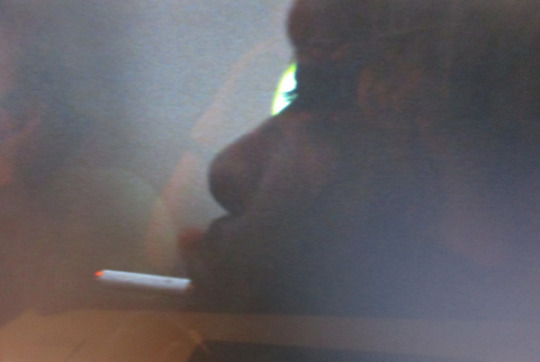
© 2019 by James Clark
These days, an old black and white film about God will find few takers. However, there is a still-practicing filmmaker, namely, Claire Denis, who pulls out all the stops to revisit such a vehicle. Is she a nun? Nope. Is she a God-fearing militant in favor of aid to the distressed? Nope. Is she a social scientist, tracking religious consequences through the ages? No, no, no. What Denis’ excitement pertains to, is the work of that mostly shunned movie, called, The Seventh Seal (1957), created by notable-no-longer filmmaker, Ingmar Bergman (1918-2007), whose output engages the intrinsic disaster of piety and smarts. (The word, “intrinsic,” is crucial here. And as such, her perspective is problematic, not formulaic.) In addition to piety and smarts, that film spotlights a young couple of itinerant circus performers in the 12th century, the husband, Jof, agog with the possibility that their baby boy could become a dazzling acrobat, or a juggler, pulling off an “impossible” trick, the kind of trick only an oracle would imagine.
Intrinsic in the travelling folks’ itinerary, is the sentence of being left out of the lives who, if not making the world go round, making the world theirs. 35 Shots of Rum (2008) contemplates the hopes of Jof, almost a millennium shot forward. As such, our film today carries the special bonus of catching up to, once again, the bittersweet world of Jacques Demy and the musical muse of Demy’s soulmate, Michel Legrand (setting out the latter master’s magical transcendence by way of those deft swallows, the Tindersticks).
Diminutive Jof comes a cropper with the salt of the earth in a medieval beer hall, and, by way of putting a less embarrassing story in the mix, he tells a gathering at his caravan that he “roared like a lion” against the mob. Our protagonist today, Lionel, a Paris commuter train driver (far from Jof’s open road), is an African immigrant-widower who dotes on his adult daughter, Josephine, still living with him. The action here is pensive in a puzzling way. Whereas Jof and Marie are on the hook to circumvent various substantial evils (the plague, for instance), Lionel and Jo seem to lead a rather uneventful, mundane existence. Their reticence to speak (a less extreme strategy of the vow to silence, in Bergman’s, Persona [1966]), counting upon face and body language, becomes a form of poetry you could study for years.
Such a peculiar, elusive narrative presents a daunting task of identifying and structuring the artistry being given to us. One readily manageable gift, however, in this connection, is the opening scene and its riches of rail lines and bustle and a high-pitched, low-textured accordion motif, keening for something misplaced and yet with an abundance of lift, rather like the music of a carousel. The first visual incident involves a set of shining rail tracks plunging forward from the driver’s smudged window. Soon we’re presented with multiplicity of tracks near a railroad station, resolving to one line describing a gentle curve as against the standard fast forward, a departure redolent of both poetry and prose. Even more palpable, however, is the jumble of wiring (a sort of Black Forest or snowstorm) and its masts maintaining electrical power and its dynamics, along with mechanical devices being a force of stasis. Constituting a form of synthesis with those visuals, there is the musical motif, filling out the progressions in such a way that we are transformed as part of the doing of a sorcerer’s apprentice. That formidable protagonist, Lionel, comes into view in close-up profile at twilight with his shift nearly over. Lighting a cigarette and gazing at a more substantial and impressive long-distance train passing by, the set of his face is far from easy. Tindersticks add a flute component, lightening the load somewhat. We see the back of the last coach, touching the black void with two sharp red stoplights near the wheels, and a more diffuse green field of action near the structure’s top. An elicitation to accentuate the positive.
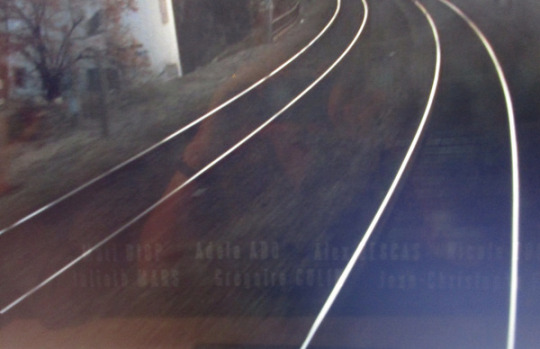
Then we see Josephine (the play of her two forms of name being a bit like the red/ green just mentioned) patient in a Metro car squashed like livestock. She stops at a kitchen store to consider a presser cooker/ rice preparer; and, presto, Lionel comes home to the flat with one, scarlet and shiny, making a statement. What with her doing the laundry and his carefully undressing and having a shower before dinner from that new appliance—she smiling on hearing him come in, and he pleased to be the bearer of good tidings—all the connection involves their silence within a sanctuary of their own perceptual making. This low-key activity allows us to salute the savvy with which they have designed their little nest—choosing paneling in very effective blacks and greys, with subtle yellow floor tiles, and with uncluttered spaces. When they’re close enough for a welcome little kiss, she tells him, “You smell of cigarettes,” a case of maintaining a pristine society. (Another of the audacious compositional touches is the virtual disappearance of Caucasians in the City of Light—Josephine’s subway, for instance, entirely filled with blacks—as if this enclave represents the best hope of clear thinking.) Seated quietly, they eat with gusto. She puts on some lively music—far less lively than what we heard along the tracks—and Lionel picks up two apples for their continued health. Sanguine, for sure; but not successfully addressing those minutes, probably frequent, in the dark engine.
Upping the ante, the only black in sight not serene, namely, Rene, an old friend of Lionel, has come to his retirement day at the commuter system. Lionel watches the man of the hour about to clean out his locker, and he is apprehensive that his friend has dangerously lost the company grip. (At his suicide, our protagonist being confronted with the horror of Rene having chosen a place on the rails where the calm one would encounter him, the latter holds a difficult silence, culminating in, “Fuck, Rene!” [you’ve overreached].) Certainly, our careful one, would never place on his locker wall a photo of a pretty sharp acrobat, spinning many plates by way of a multiplicity of long sticks. To ponder such sensuous acuity is to be on the hook to see and feel things in a very different light. Lionel, on that special, presumably happy day, comes upon that aficionado as he trembles. And being a rock of some endurance, urges, “You can’t fall apart now. Not in front of everyone…” On to the retirement party, and Rene can’t manage a smile. From the girls, there is a beautifully designed, rather rakish, leather jacket. From the “brothers,” a scepter (ravishing in its mosaic details), the likes of which a jungle king would have close-by when presiding. Still glum, Rene manages a brief speech: “My friends, thank you for being here. I’ve waited so long for this. It’s a deliverance, you know. [His troubled manner has all of them on edge.] Tonight I feel like… I have wings…” On the Metro, with Lionel, his scepter wildly incongruous, he tells his friend, “Surrendering… Surrendering to this condition, is what’s so hard. I’d liked to have died young. But I’m at the age I’m at. And healthy as an ox. I’ll die at 100 at this rate… I don’t have this life in me. The subway and all that. It hit me unarmed and unprepared…” A few days later, they meet coincidentally in a bar. Lionel asks, “Got any plans?”/ “Tons,” Rene ironically replies. (Another gift, during the festivities where the lucky man spends most of the time with head bowed, is an iPod. Someone tells him, “All your music at your fingertips!” Music, again, but bulk; and Rene, the acrobat manqué, feels the pain without a plan to beat it. Lionel had for years been staging special events, dear to his heart, in the form of a drinking binge of 35 shots of rum in quick succession—his sense, for what it’s worth, of regal acrobatics. “Down the hatch,” a woman in the company [all black, of course] is cheered on. She ends her run at 16. The natural follow-up would be for Lionel to run a row of slam-dunks. But, to the surprise of all, he says, “Not tonight…” The vision of Rene’s horror has induced that current of self-criticism in our protagonist, rarely elicited; and soon it’s back to the tune of, “Fuck, Rene!” Oodles of charm, a go-to friend, to many. But.)
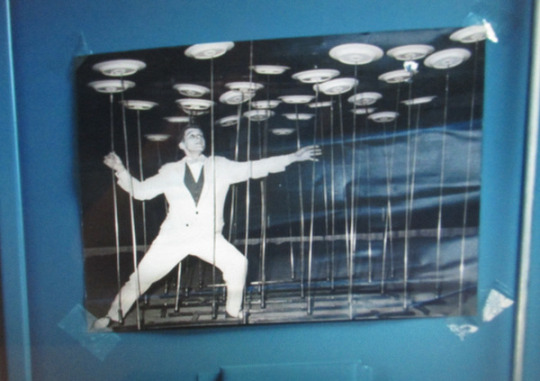
Jo, within the aura of Marie (a 12th century pragmatist), is enrolled in a college program of Economics, where she can practice utopian possibilities. The first sustained action in the world at large where we see her is to go jogging with a young mulatto man, Noe, who occupies the penthouse of their building; and joins Rene in distraction—not due to lack of understanding but lack of devouring. (That would introduce, though, the third member of Jof’s troupe, namely, Scat, who sleeps in a hammock near the ceiling of their caravan, and sleeps with as many women as he can.) They’re in cool apparel as they cruise along the industrial service road where their building stands. She begins to outpace him, and, true to form, he jumps into the Seine (far from the Seine of tourists and billionaires). “You’re crazy!” she laughs, when he regains the service road and the upper hand. (The little acrobatic, of the jog which suits her, being eclipsed by jagged face-saving and latent hostility.)
While Josephine wends her way to oblivion, there is a woman, Gabrielle, the unofficial manager of the easily managed centre, who shows to us, if not the virtues of wide variety of mood, their capacity to put into play juggling initiatives, come what may. One thing she does have up her sleeve, however operative, is the tangled history of films about taxi drivers (she being one), particularly, Jim Jarmusch’s film, Night on Earth (1991) and Abbas Kiarostami’s Ten (2002). She begins her tenure on the pavement with the complaint, “This is not my day…” A young dude, needing to move only a few blocks, counsels her to practice “flexibility;” but, in fact she’s already on the case. She maintains that she knows very well how fortunate she is, in finding every day to be unique. And, “No boss breathing down my neck.” In addition to her being a queen of the road, she’s frequently sitting in the dark, on her balcony or even in the stairwells of her home. Jo, rather obtuse for a closet mystic, teases her that she’s still carrying a torch for Lionel, who lived with her for some time before and after Jo’s German mother died, necessitating the young girl to come to Paris and her bemusing father. Despite the misalliance, all the players in this relationship have generally found ways to pleasurably intermingle. But the ways of volatile Gabrielle are not the ways of muted Lionel and Josephine. She also visits that bar where Rene needs the alcohol, and gives him a sunny smile (during the interregnum of Lionel’s patriarchy Rene would have been a frequent guest). After a quick espresso, she’s out the door to get back to work. And from the suicidal one’s perspective, and its remarkably dirty windows, she’s been transformed from incandescence to a blizzard of grey deadness. Such a fate dogs her to the end, a veritable sentence of solitary confinement. But it is her resilience, notwithstanding (like the taxi/Mom in Ten), which matters. (A “Fuck, Rene!” [and all the other cripples]; but in being disappointed for him and the rest, not pissed off that a lame clique had been abandoned.) She undertakes posting a thankless note about the by-law there, about someone leaving a bike in the hall. (Noe trips over it in a dark passage; and all he does is yell, “Shit!”) More thankless care comprises how often she invites Josephine to her suite and is given excuses that her studies come first. The four of them are excited to have tickets for a popular band. Off they go in Gabrielle’s car in a rainstorm—she, knowing Lionel only too well, asks, “Got your wallet?”—and the car breaks down (Gabrielle, as so often, no doubt, succumbs to, “I can’t believe this!) due to transmission problems. The concert never happens for them, how could it? But they’re within walking distance to a Jamaican restaurant they know, insisting, “We didn’t feel like going home like this.” (Remarkably, though, the place had already closed; but, in the current of the fantasy easiness here, the woman-proprietor welcomes them, and happily prepares suppers on her own. On the other hand, that generosity and sanguinity is something else.) The sound system comes to life, and Lionel and Gabrielle enjoy dancing together. Jo smiles at this, and soon she and Noe are the night’s special event, the passion of their embrace becoming a concern for her dad and a reflection for Gabrielle. The food arrives, and the host’s black and white dress is like a bit of outer space, a bit of a silent concert. Noe, while dancing with Jo, exclaims, “You’re something else!” He got the wrong girl. (During the inevitable wedding, Jo tells Gabrielle, “You’re not going to cry?” When the latter tries to help with the bride’s outfit, Lionel tells her, “Jo can do it herself.” We last see her sitting alone in a shadowy stairwell.)
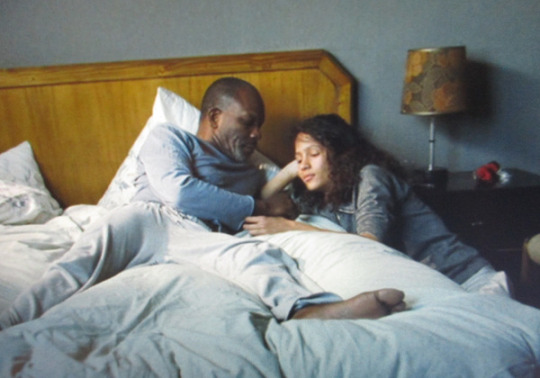
The sequel of that calypso meal finds three of the four at Noe’s apartment. His cat has died, and he disposes of it with not a moment of care. Dumping the body into a garbage bag, he brags, “No frills, he’s dead and gone for.” This finds Josephine covering her nose and mouth, and saying nothing. Gabrielle’s asking for an aspirin at least reflects being distraught. (Here the axiom, stemming from Jarmusch, of abusing a pet, means the abuser has metaphorically become roadkill.) With this he announces his interest in moving to Gabon (“pays well”); and Jo goes through the motions of dissolving what was supposed to be elevated performance. Wouldn’t you know he’d couch his departure with, “Now that my cat’s dead, I’ll like it” [the offer]—more fake acrobatics. But this shake-up involves depths and shallows, to savor, racing back to the lyrical and ambiguous curve of the tracks in the first scene.
Jo protests, “You’ll ditch us and go away?”/ “Why not?” the TV poker gamer bluffs. “You always tell me how it’s ugly and old here” [a list of her surprising immaturity including being unmindful of the historical and advanced possibilities of Paris]. In this context, a cut to Lionel, who for various reasons might have preferred sleeping to remaining in that company, finds him walking along a sidewalk eating a croissant—to him a non-ugly factor. On arriving home, he finds Jo in a frenzy to clean their flat. (While still on the sidewalk he notices her putting finishing touches to cleaning Noe’s balcony window—forcing her to stretch in a precarious way. [Acrobatic, sort of.]) Lionel’s confusion about the cleaning blitz extending to his place displaces his placing out more croissants, and messes up his reading the newspaper designed for flat-earth fanatics. “Why are you doing housework?” the sort of poet asks. “Isn’t it clean enough?” When Noe yelled, “Shit!” was he in error? Does Gabrielle’s client/stranger’s demand for “flexibility” start biting here? Jo moves on to rifling through old photos, including one showing her German mother and Josephine as a baby, and proposes throwing all of them out. Lionel is far from happy about this frenzy, so foreign to his learning. She counters that, “It’s filthy here! We need to empty it all out.” Her recruitment by Noe has no heart for a mosaic on the wall, traces of her father’s rather pathetic poetry. In the confusion he calls out, “This makes no sense! Think of yourself.” To which she counters, “Noe’s leaving!… I’m leaving, too” [the clean-up in the service of giving her father a clean home to be alone with]. “Don’t be silly. We’ll do as we please. As we always have. Nothing will change…” is the desperate hope. Jo yells to him, “Yes! Everything will!” Finding among those keepsakes a letter written by her mother to Lionel living in Paris and living with Gabrielle, we are taken up by a facsimile of one of those enthralling dramatic dialogues which Bergman had become a master in delivering, to deepen our understanding of the principal’s dilemma. “Lionel, I miss you. I miss you so much. Josephine finally fell asleep. She looks like you when she sleeps. It makes me love her even more. Please let me live by your side every day. She’ll be my daughter, too. My love, my rascal…” On the heels of that discovery, Josephine knocks on Noe’s door. When he opens it, she finds his arrogance: “You have something to tell me?”
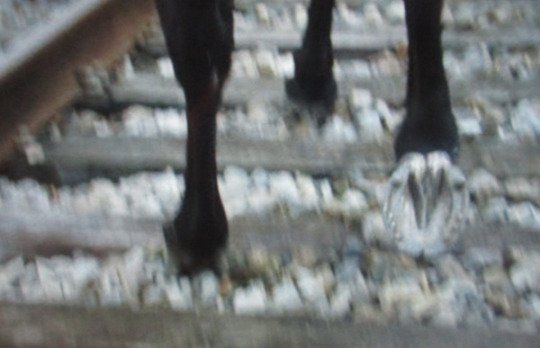
Coinciding with that Road to Gabon, Lionel, “the rascal,” has lost Rene, but in the course of a rhapsody/daydream on the job, he conjures a horse and a wagon on the tracks as far back as the heights of Jof and Marie. Somehow the image of Jo also appears, for a fraction of a second—this being an apparition for the ages, regardless of stiffs like Noe. And thereby they take off the tarp from their long-dormant Volkswagen van in the underground of the facility (close to where Gabrielle parks, with the little touch of pedantry masking her roof-light to offset rascals), to play one last (confused) victory lap, to Germany (where Jo learned to speak German before reaching Paris after her mother’s early demise). In a cast generally mustering understated performance from blacks and their secret hideaway to transcend a terminally polluted mainstream presumptuously claiming to be viable, the home stretch unveils an elderly German lady (Jo’s grandmother), who takes over—a bit of a scandal in an era of race obsession—as a Bergman oracle, typically smothered by a roster of fakes. “We don’t see you enough. That’s the way it is now. We all live such withdrawn lives [Jo, if only she were alert enough to grasp the outrage being alluded to]. Everyone in his corner. Every man for himself. Would you like some coffee?” (Jo’s capitulation coming across subliminally, as in, “Yes, I would Ma’am.” The hostess retorts, “You don’t have to be so formal” [largely mundane, Jo, having succumbed to formulaic piety and smarts]. You must have been driving all night [as with Jof and Marie, on that long night when “formal” Death commanded nearly everything in sight]. You can stay for lunch, or even spend the night.” Jo replies, in German, “Thanks, but we want to get back on the road [brave words, but here the usual subterfuge; and masking, I’ve got a wedding to bring off, with a fake acrobat]. Maybe some other time” [when hell freezes over]. Does this obtuse connectivity derive from Denis’ background in Africa?) The old gal, disappointed with her prim relative, subtly mocks, “Some other time…” She swings past this transmission problem, however, by recalling a (very) brief joy. “Your mother said she fell in love with a guy in Paris. I asked her, ‘Is he cute?’ [oracles not likely to pose such questions in a straightforward way]. She looked me straight in the eyes and said, ‘You’re going to like him’” [the speaker has a troubled face and she looks downward]. Rallying once again, in face of this semi-invasion, or Death, she finds something lively. “I taught her to swim. She was scared of the water. We’re all scared of it. I’m also scared of that [nearby, North] Sea. So vast, so wide. And when you scream, no one hears you… Lionel, do you remember that time when we all went swimming together? We basked in the sun. Lost in the dunes [ring a bell?]… Good wine [she smiles]. Not always that good” [when Lionel was buying; the volatility raining down, and needing to be met]. Though he would not follow the verbal language, there was, in the body language of this transaction a delivery of that day. A delivery the steady and gentle “cute” “rascal” chooses to ignore. “You don’t remember?” she asks him. Her hurt, from this lie, is short lived. “Why don’t we drink some wine? A little glass of wine, now. Why not?” (There is a cut to a wall in that room, showing Jo as a baby held in her mother’s arms; and a dark print of a nude woman seen from behind, treading into the sea at night with a moon casting moonlight on the sea. Iconic matter, to someone, anyway.) “A little glass,” she perseveres. Then they are all drinking that wine. Lionel silent, in a dilemma, unsheltered by his usual comrades. The oracle has more to say. “Sometimes it seems the whole world is scared of suffering. Everyone wants either total stress or some peace in their happy little lives. But not us, not us! We’re strong, aren’t we? Aren’t we Lionel?” The latter minor poet, gracing so many rigors, comes up empty here, very well understanding that he is hated. “I’m glad Josephine gets by in German. It makes me happy” [dipping into the “happy little, prosaic lives” so potent in Bergman’s Fanny and Alexander]. “Just like your dad” [to be a stiff], the lady, clearly fluent in French, skewers a surprising target.
After a short stop to the grave, pouring some water on the flowers, while golden leaves waft down in lieu of almost total neglect, the van reaches the shore, recalling the embarkation of buttoned-down Block and his squire (the aristocrat who fails, and the salt of the earth, who also fails), coming ashore from a crusade centuries ago. It’s All Saints Night, and a group of children, carrying lights and singing, goes by their caravan, etched vividly in the twilight as they negotiate a ridge. Peering out of their home away from home, they fail to pierce the urgency of that full-hearted dash for the sake of a lively life, so long ago and remaining to be fulfilled.
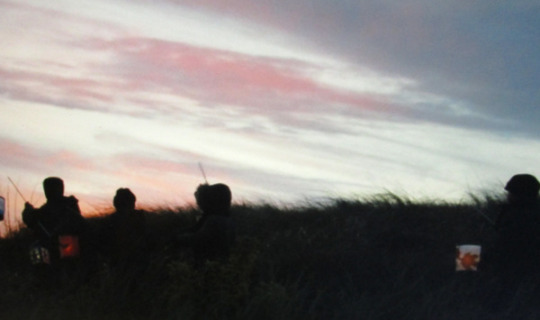
How dare, then, Lionel’s wedding gift of a rice-cooker (“Living Tech” brand), snow-white with a few sissy images at the base—as if to look down upon Jo’s retreat? The slight fails to register with Jo, but it had better register with us. There are many enclaves on this planet sworn to never hear a discouraging word; and some—like that of the club we’ve just taken the depths of—actually being overachievers. But thanks to that oracle, our love affair of the sweet (musical) suite and the sweet apprehensions (as in the small handful of great Demy films) must unequivocally demand more. As the wedding reception rolls on, with a pianist a bit less sweet and a bit more bitter, Lionel climbs the rum shots game, to perhaps reach something to quieten his malaise. “A moment like this only happens once,” he overstates. Neither a consummate acrobat with his rum, nor a consummate juggler with cronies, Lionel—harkening to that siren call having endowed those falling short in Demy films remaining lovable (and a lovable longshot for reaching the strictures Jof had in mind a thousand years ago)—settles in to enjoy the party. But his miasma (far more potent than the ton of rum he’s feeling as we leave him while never forgetting him) is the real concern of this masterful film.
As if a divided homage to this rather secret society—and especially the secret society that was Lionel and Josephine—Denis has planted several factors in her film which amount to a possible blossoming of a long-overdue being “strong,” and not being “scared of suffering.” Some we have already encountered—for instance, Lionel and Jo on a long-ago horse, implying proof against the fear of the likes of Rene. And yet a mark of shame, due to that shining, though flawed, accomplishment of Rene, so more honest. This touches upon the pedantry of Josephine, in action during her college preparations, to become what many others insist she settle for. She mouths, like so many others before her, that “the Global South has not been handed the credits to thrive. “It is neither right nor wrong. Rules, used to manage international debt-loads, impose trouble upon countries in debt. I don’t think we can ignore (Joseph) Stiglitz” [American Nobel Prize winner, in the field of “Economic Sciences”]. (The Prof notes, “You say it as if it’s totally self-evident. It’s a little pedantic…” [pedantry eliciting fear, as in Wild Strawberries]. Another student—coinciding with flawed but somewhat cogent, Rene—argues, “When we revolt, it’s not for a particular culture. We revolt simply because, for many sources, we can no longer breathe…” More bookishness surfaces during Rene’s finally returning a book he borrowed from Lionel. The latter admits that he had forgotten all about it. The subject was about the evils of being “educated to death,” which, it transpires, had become a joke amidst the cognoscenti. The title was Mars [War]. We can well understand why he, so scared of suffering, forgot about it. But that he touched it at all, is a revelation!) On Noe’s wall is a poster, titled, ODISSEA 2001. Flashy optics. No Mars. Their marriage won’t last a year. Then, what?
Many viewers, with a didactic bent, have inferred that 35 Shots of Rum is patterned on the Yasujiro Ozu classic, Late Spring (1949). They claim to have strong evidence by way of the Denis documentary, Talking with Ozu (1993). A few narrative steps do coincide; and the rather precious disinterestedness of the Japanese protagonist does (vaguely) show that area of musicality here. Could the contrasts between the films be urgent here—Denis’ film being modern cool, while Romantic Ozu fumes about the cruel frozenness of Japanese action? Another aspect of Talking with Ozu, is her warning that she “dislikes auteurism and the cult of cinephilia.” The pros read this, and proceed nevertheless—a move like stepping off the observation deck of the Empire State Building. The bona fide involvements here, with Bergman and Demy/Legrand, have very little to do with the movie industry, as it has chosen to fool with.
0 notes